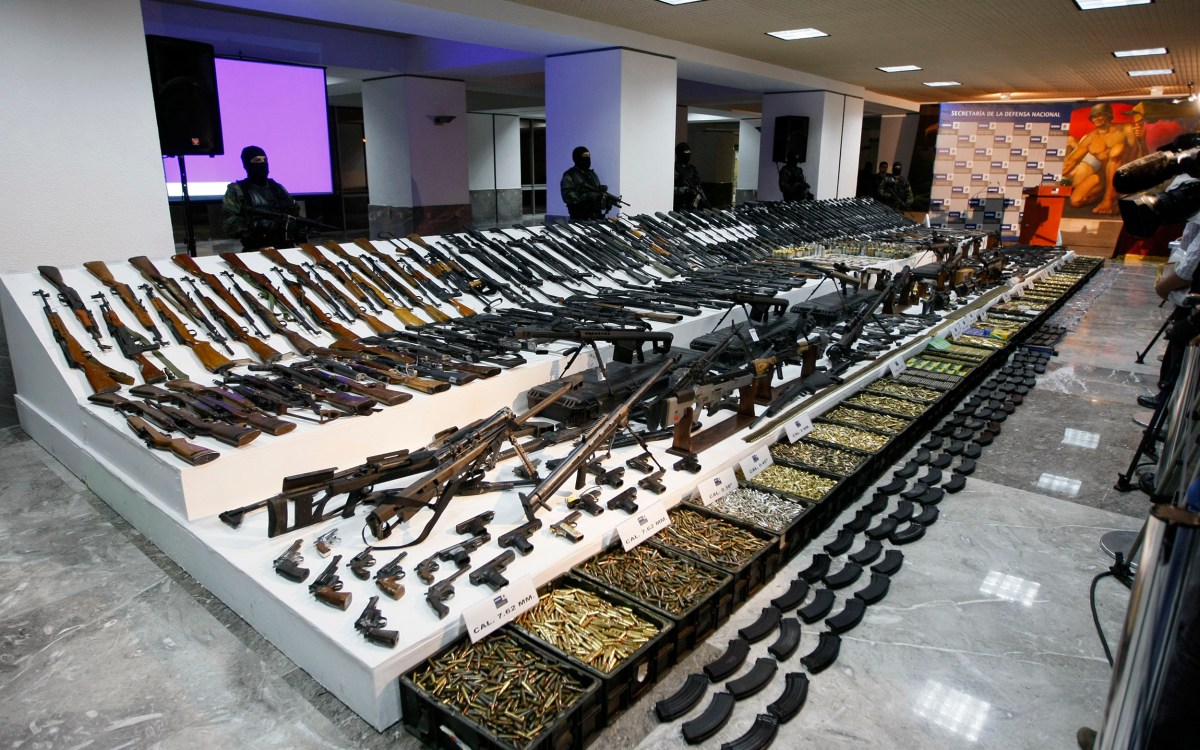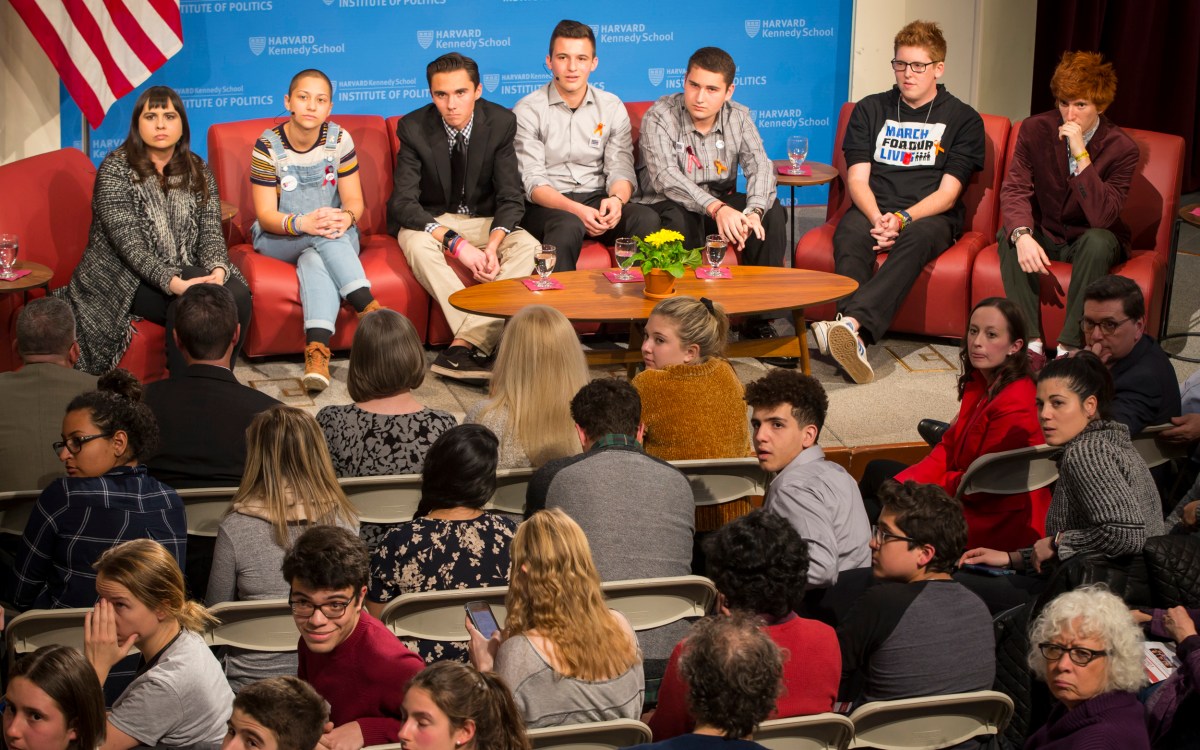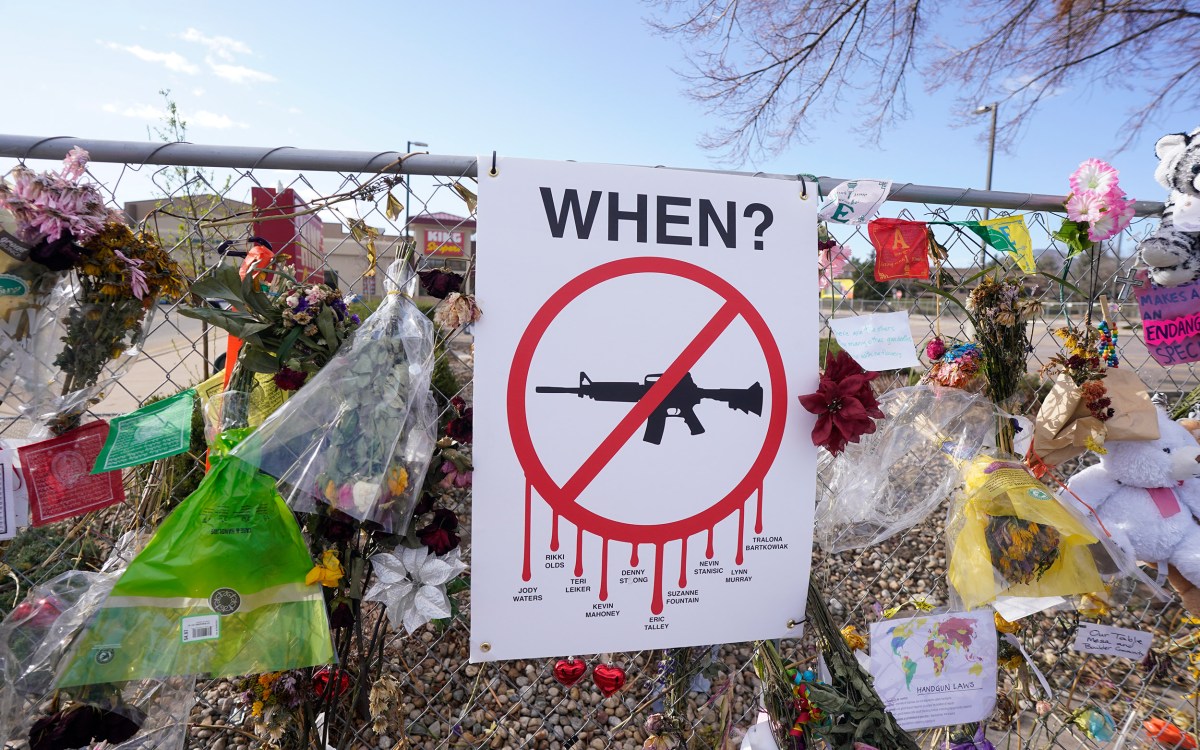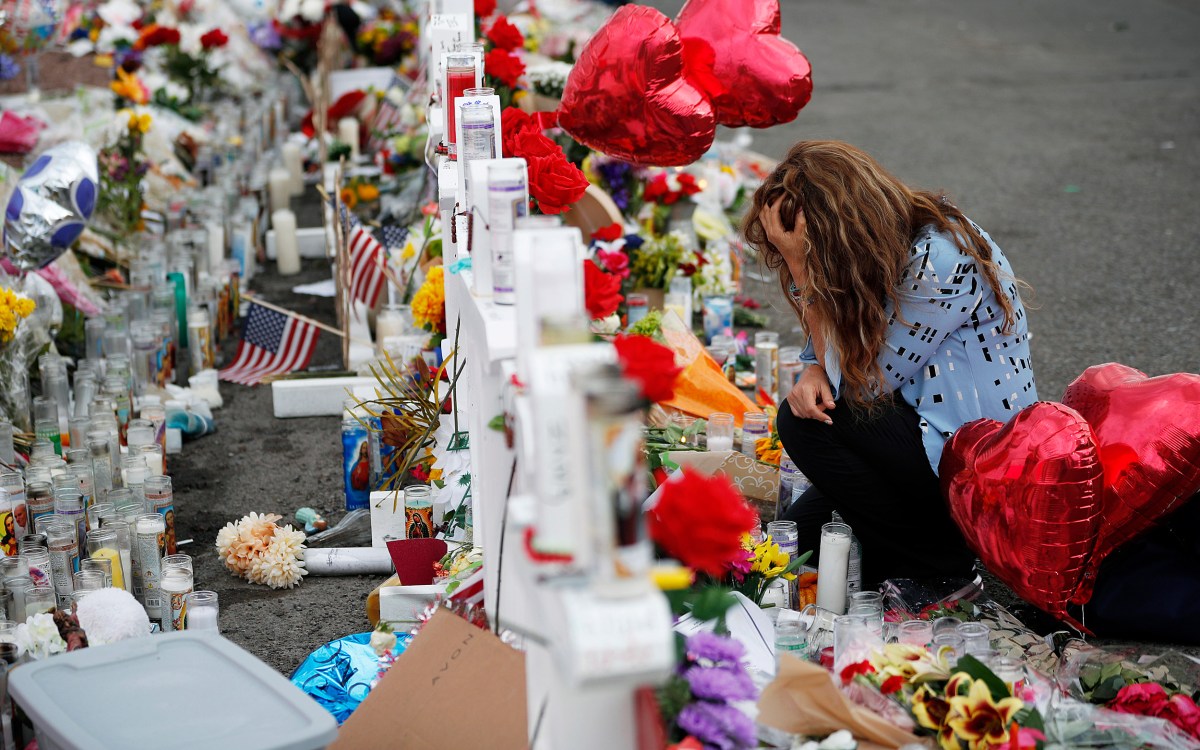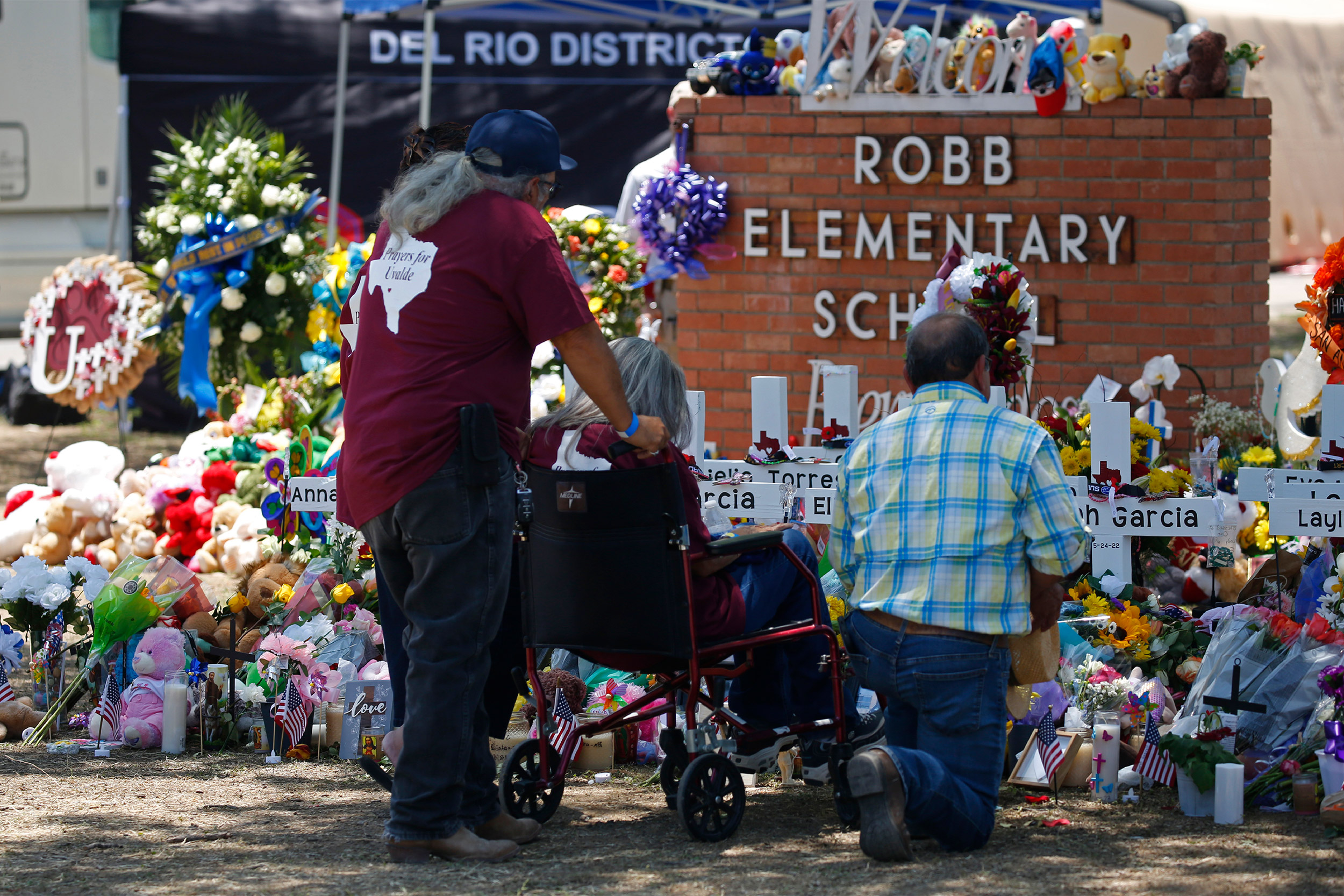
A memorial outside Robb Elementary School in Uvalde, Texas, where 19 children and two teachers were shot to death.
AP Photo/Dario Lopez-Mills
Some light in distance for major curbs to gun violence
Chan’s School’s David Hemenway uncertain about effects of Uvalde deaths, but believes growing body of research will turn tide in time
As the nation tries to make sense of the murders of 19 children and two teachers at Robb Elementary School in Texas, there seems widespread recognition about how difficult it will be to spark change in the polarized debate on the issue. The Gazette spoke with David Hemenway, a professor of health policy at the Harvard T.H. Chan School of Public Health and an expert on gun violence and efforts to control it.
Q&A
David Hemenway
GAZETTE: What did you think when you heard about the shooting in Texas?
HEMENWAY: It’s just so sad. It’s kids and other innocents. We should also remember though, that on that same day probably 110 to 120 other people were killed with guns. Their names we don’t know. Unfortunately, certain types of violence are contagious, such as school shootings. Some troubled individuals may read about these killings, and it gives them ideas; some may even try to outdo previous levels of killings. That’s deeply concerning.
GAZETTE: Since the tragedy, I’m hearing a lot of resignation that things will never change. Do you share that resignation?
HEMENWAY: Being in public health, there have been so many success stories. They always take much longer than you hope, but after a while things finally reach a tipping point, and suddenly we have fire-safe cigarettes or safer rules for school sports, so I have a lot of long-run optimism. I’m not optimistic in the short run, though. We have become a nation of two tribes and, unfortunately, the gun issue has become a major part of the culture wars. We seem to be currently at a deadly stalemate.
GAZETTE: Are there any signs that the stalemate is changing?
HEMENWAY: In the last few years, there have been at least a few good signs. There has been a lot more firearm research. There’s finally been some federal money for research after 25 years of virtually no funding. There are now so many more scholars researching gun issues that I think the science eventually will matter and make it harder for the gun lobby to say things that aren’t true. The data system is gradually improving — all 50 states are now reporting to the National Violent Death Reporting System. As more studies come out, it will be harder for the gun lobby in the same way it was harder for the cigarette companies to make false claims about cigarettes.
GAZETTE: I had thought Sandy Hook would be enough to prompt change. It wasn’t, and there have been several similar tragedies since then, not to mention the gun suicides and other killings whose body count far outstrips these mass events. Can any single event be large enough to change the national conversation?
HEMENWAY: I hope we don’t find out. What’s terrible is there are so many more military weapons out there than when the assault weapons ban was phased out in 2004. We did a study showing that the states that banned large-capacity magazines, compared to those that didn’t, had fewer public mass shootings, and fewer people killed per shooting. The ability to kill so many people so quickly is just horrific.
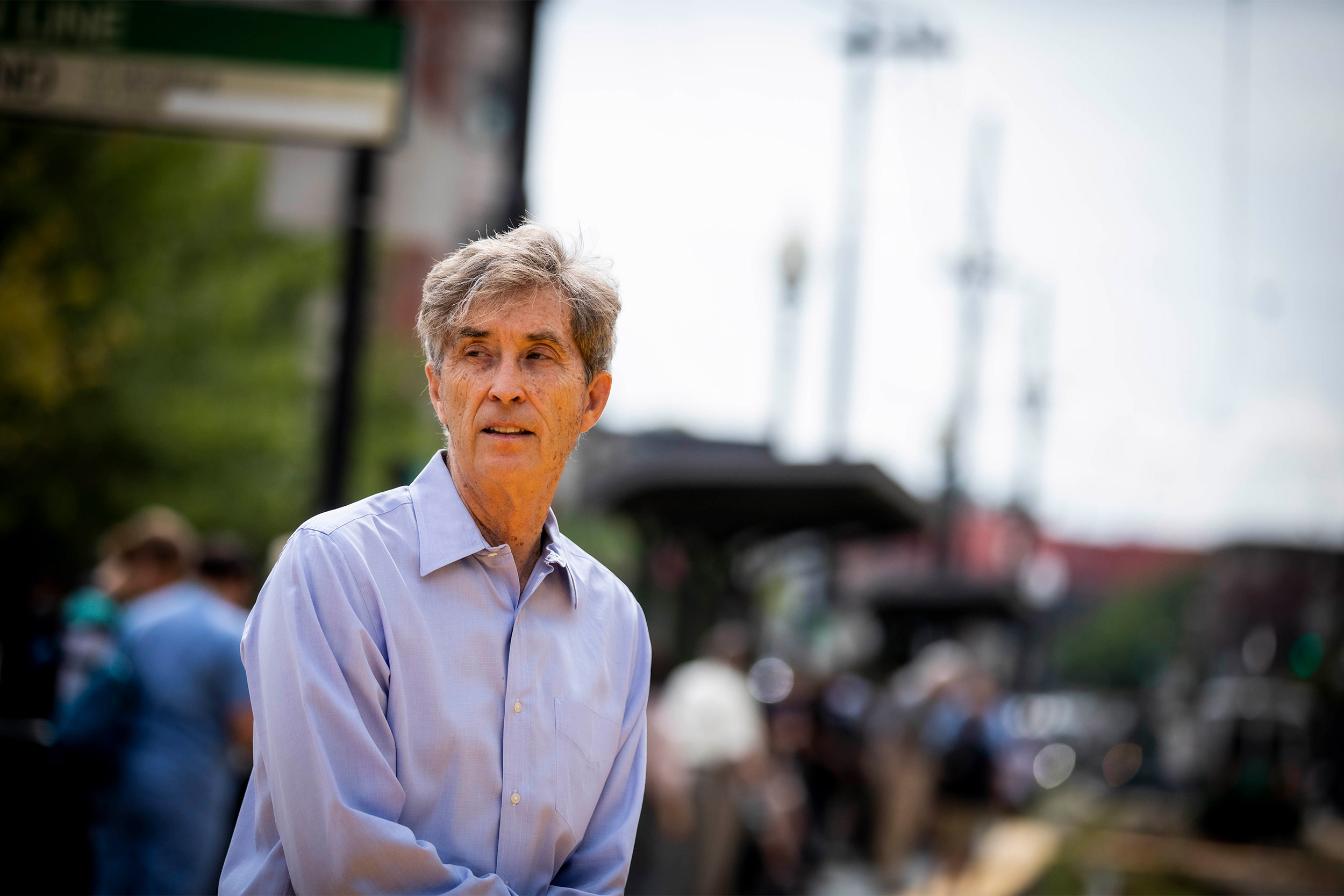
“As more studies come out, it will be harder for the gun lobby in the same way it was harder for the cigarette companies to make false claims about cigarettes,” said David Hemenway, an expert on gun violence and efforts to control it.
Rose Lincoln/Harvard file photo
GAZETTE: Is there any low-hanging fruit among gun-restriction proposals that might be more possible now than before?
HEMENWAY: There is lots of low-hanging fruit in terms of low cost, large benefit. But I don’t see much low-hanging fruit in terms of politics, given the present political climate. The closest might be red-flag laws. And even in the states that already have them, we need to make sure they are working well, including that everybody knows they exist and how use them. I personally would like to see the federal government do a lot more engineering research on issues like smart guns and ballistic fingerprinting, so it would be easy to figure out which gun a cartridge came from. But for that to have the largest effect, you also need gun licensing to go with it.
GAZETTE: Since things are so deadlocked at the federal level, is shifting strategy to the states a way forward?
HEMENWAY: The problem is that after the mass shootings in the last 10 years, the blue states passed slightly stronger gun laws and the red states passed slightly weaker gun laws. That may make it a little safer for people in the blue states and less safe for those in the red states, but the overall effect may be to make things worse, because crime guns move across state lines from states with weak laws to states with strong laws. Among various good things that have happened is that states like California and New Jersey have appropriated some money for gun research. Plus places like Massachusetts General Hospital, Kaiser Permanente, and the University of Michigan are funding gun research, so at least that’s something. And there are two dozen or so law firms that are providing pro bono legal services for gun-control advocates. Unfortunately, we currently have an incredibly conservative Supreme Court that may restrict legal efforts to reduce our gun violence problem.
GAZETTE: So the states that might be amenable to tightening up restrictions have pretty much already done it?
HEMENWAY: They can do more. Even Massachusetts, which among U.S. states has among the strongest gun laws and lowest rates of firearm deaths, could do more. For example, we could begin to regulate ghost guns [untraceable guns that are bought online and assembled by the buyer], add a waiting period for firearm purchase, and do more to restrain bulk purchases. But the big problem lies in the states with the weakest laws. That’s a big problem not only for them, but for the states like Massachusetts because our gangs and other criminals are not typically using guns that were bought in Massachusetts but guns that were brought into Massachusetts from these weak-law states.
GAZETTE: So it truly is a national issue for that reason. Are you concerned that the Supreme Court might strike down the New York handgun law?
HEMENWAY: I don’t know what the Supreme Court is going to do. I was shocked in 2008 that suddenly after 200 years they discovered a new Second Amendment [in District of Columbia v. Heller], one in which the first half — “a well-regulated militia, being necessary for the security of a free state” — was eviscerated. I fear they next will change the meaning of what “bearing arms” meant in the 18th century, which was always about the military. You could go hunting with guns every day, but that did not mean you were bearing arms.
GAZETTE: How about your own research? Where are you focusing next?
HEMENWAY: We are working on lots of issues, including defensive gun use — which is often beneficial, but sometimes detrimental, to society — Black gun ownership and Black suicide — why Black suicide has been increasing and why its patterns are so different than white suicide. We are continuing to look at police killings and also suicides that occur when police are present. There are hundreds of such suicides each year; maybe we can figure out how police might help prevent those suicides.
GAZETTE: Gun sales have climbed in recent years. Do you know whether that’s due to more people buying guns or more gun owners?
HEMENWAY: We’ve conducted studies on this issue. It was well known that background checks were skyrocketing, but were these new gun sales and were the buyers people who already owned guns? We found that not only were more new guns being sold, but more people were buying guns this time around, a lot of whom hadn’t had guns before — African Americans and women are disproportionately becoming new gun owners.
That doesn’t mean that most gun owners aren’t still old white guys, but neither having more guns nor having more gun owners is good for society. A related important problem is that at a time when more studies are confirming that a gun in the home does not increase home safety but makes the home much more dangerous, on average, to the people in the home, more and more people believe the opposite. Researchers are trying to figure out how best to help people understand the science.
GAZETTE: Is that misunderstanding behind the rise of gun ownership among African Americans and women?
HEMENWAY: I think the real reason for the rise is COVID.
GAZETTE: Anxiety about society’s breakdown?
HEMENWAY: There are various hypotheses, but I don’t think anyone knows for sure. It is a worrisome trend, especially if it continues when the pandemic is over.
GAZETTE: Has messaging been tried directed at individuals on suicide risk and lack of safety with guns in the home?
HEMENWAY: Cathy Barber, in our group, has been working with gun owners, gun shops, gun ranges, and gun trainers for well over a decade. She’s had a lot of success trying to get them to understand that they can really help reduce suicide. In a lot of suicide attempts, the feeling is transient — someone may just wake up in the morning and though they’ve had problems in the past, that morning it’s just overwhelming. If you can get them through that period they’ll be out of danger. That’s why we hold suicide watches in prison, because there’s a high-risk period and if they can get through it they are unlikely to commit suicide. The notion Cathy promotes is similar to the “friends don’t let friends drive drunk” approach. We want friends whose friends are going through a bad patch to hold or “babysit” their friend’s guns.
Now some gunners are promoting it as the 11th commandment of gun safety. Hopefully, 10 years from now, holding your friend’s guns when they are at risk for suicide — they’re getting a divorce, drinking, and talking crazy — will be just as common as being the “designated driver.” We want everyone to understand that if someone shows suicidal symptoms, make sure that they don’t have easy access to a gun until things get better.
GAZETTE: Is another school shooting inevitable without change?
HEMENWAY: Nobody knows, but if I had to bet, I would say yes. We seem, as a country, not to be able to figure out how to get the needed political action to prevent it. In the short run, I’m pessimistic about these things, but beneficial change in public health is rarely easy. In the last 100 years, cars got safer, cigarette smoking fell, most school sports are less dangerous — it’s not perfect — but we’re not where we used to be. If the change were easy, it would have already occurred.



